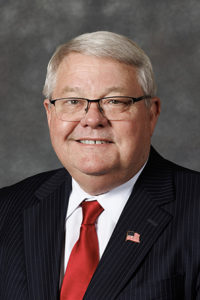Limits on school, ESU bond elections clear first round
A bill that would limit when school bond elections may be held was amended and advanced from general file March 12.

LB135, sponsored by Bellevue Sen. Rick Holdcroft, would prohibit schools and educational service units from conducting special elections for a bond issue, property tax levy or exceeding a property tax levy limitation. Under the bill as introduced, such questions could appear on ballots only during regularly scheduled elections or on traditional election dates.
Holdcroft said having school bond questions coincide with regularly scheduled elections, which generally have higher voter turnout than special elections, would engage more voters and make sure their voices are heard on issues that affect their property taxes.
He offered several examples of low-turnout special elections, including a levee override for Millard Public Schools in 2023 that passed with 34.5% voter turnout, and a Papillion-La Vista bond question that passed with 33% voter turnout.
In addition, Holdcroft said, Millard Public Schools voted unanimously 30 days after the 2024 general election to put a bond question to a vote of the people, which took place on Feb. 11, 2025.
“I can’t help but ask why couldn’t they have proposed this sooner so that it could have been put to a vote of the people in November of 2024?” Holdcroft said.
A Government, Military and Veterans Affairs Committee amendment, adopted 30-4, would broaden the bill’s parameters to also allow for special elections in odd-numbered years on certain dates.
Committee chairperson Sen. Rita Sanders of Bellevue said the amendment was the result of feedback received at the bill’s public hearing. The changes would provide school districts more flexibility, she said, and elections would occur during times of the year when voters already are accustomed to going to the polls.
Under the amendment, special bond elections could be held in odd-numbered years at the following times:
• on the first Tuesday after the second Monday in May;
• on the first Tuesday after the first Monday in November; or
• in conjunction with a political subdivision’s regularly scheduled general election.
Sen. R. Brad von Gillern of Elkhorn expressed concern that requiring all school districts to hold bond elections at the same time could make contracting for those projects difficult.
“If all the projects come out at the same time, it creates a real problem with the resources that are available within the construction marketplace,” von Gillern said.
Kearney Sen. Stan Clouse said he opposed LB135 without the committee amendment, but that the change would provide enough flexibility for districts to hold bond elections when needed. He acknowledged that having set election dates could create “a bottleneck” for school construction projects, but said districts would need to keep that in mind during planning.
Sen. George Dungan of Lincoln spoke in opposition to the bill and the committee amendment, pushing back on what he said was the implication that district bond elections are scheduled in an attempt to “dupe” voters who aren’t well-informed.
The fact that voters often support bond measures should be seen as what it is, he said — evidence of their support for public schools.
“I think that the voters should be trusted,” Dungan said. “Voters in [any election] have the opportunity to go to the polls and … make their voices heard. And I think, all too often, here in the Legislature, we respond by implying that voters don’t know what they’ve done.”
Omaha Sen. John Cavanaugh said he understood the goal of the bill and the amendment, but that a better approach might be to simply delineate “blackout dates” around existing elections when special elections could not be held.
Doing so could achieve the goal of not having special elections held so close to regular elections, he said, without being “overly proscriptive.” For example, Cavanaugh pointed out that Lincoln and Omaha have primary elections in odd-numbered years that don’t coincide with the dates in the committee amendment.
During debate, Holdcroft offered an amendment to exempt the state’s fastest growing schools from a provision in LB135 that would prohibit districts from holding a second special election on a defeated bond measure within 10 months.
Under the amendment, school districts that have grown by an average of at least 3% and by at least 150 students over the preceding three years would be exempt from the provision.
Holdcroft said the amendment would give greater flexibility to school districts like Gretna and Bennington, whose capital construction needs may outpace the bill’s election schedule.
The amendment was adopted on a 30-3 vote.
Sen. Jane Raybould of Lincoln remained opposed to LB135, saying it would erode local control even in its amended form. She also noted that the Holdcroft amendment would not apply to Lincoln Public Schools.
“Allowing local jurisdictions — political subdivisions — to determine when is the appropriate time to get the election scheduled should be up to them,” Raybould said.
Following adoption of the amendments, lawmakers voted 27-9 to advance the proposal to select file.


